István Pál Ádám
Kontakt: istvan.adam@cefres.cz
od 1. ledna 2016 působí jako postdoktorand v CEFRESu díky spolufinancování z fondu Univerzity Karlovy na podporu pobytů zahraničních výzkumníků. Jeho výzkum se pojí se studiem prostorové kontroly, kterou disponovali středoevropští domovníci a tvoří součást výzkumné osy III.
Chiara Mengozzi
Kontakt: chiara.mengozzi@cefres.cz
od 1. ledna 2016 je postdoktorantkou v CEFRESu díky spolufinancování z fondu Univerzity Karlovy na podporu zahraničních výzkumníků. Její výzkum nazvaný Animal Matters: tázání se po antropologických rozdílech a literarních normách tvoří součást osy II výzkumného záměru CEFRESu.
Giuseppe Bianco
Kontakt: giuseppe.bianco@cefres.cz
získal finanční podporu v CEFRESu v rámci programu pro krátkodobou mobilitu na období 4 měsíců (květen-srpen 2016). Působí jako postdoktorand na univerzitě Lyon III a zabývá se studiem mezinárodních filosofických kongresů mezi lety 1900 a 1950. Jeho výzkum je začleněný do osy 1 výzkumného záměru CEFRESu.
Ioana Cîrstocea
Kontakt: ioana.cirstocea@cefres.cz
vědecká pracovnice v rámci CNRS (UMR 8209 CESSP Paris), je na krátkodobém vědeckém pobytu v CEFRESu od 15. dubna do 15. června 2016. V rámci svých výzkumů se zabývá tématem Gender jako nadnárodní platforma. Sociologie šíření feministického vědění ve východní Evropě v 90. letech 20. století. Její práce jsou začleněny do výzkumné osy 1.
Perin Emel Yavuz
Kontakt: perin-emel.yavuz@cefres.cz
šestiměsíční pobyt (březen 2016 – srpen 2016) v CEFRESu v rámci programu na podporu mobility, přidružená k Výzkumnému centru pro umění a jazyk (CRAL-EHESS UMR 8566). V rámci svého výzkumného projektu se zaměřuje na téma Konceptuálně orientovaného avantgardního umění v Bratislavě 60.-80. let. Její výzkum tvoří součást především 1. a 2. osy výzkumného záměru CEFRESu, ale dotýká se také výzkumné osy 3.
Ségolène Plyer
Kontakt: s.plyer@cefres.cz
je odborná asistentka na Univerzitě ve Štrasburku a v CEFRESu působí v rámci Programu na podporu krátkodobých mobilit v období od 5. února do 5. května 2016 za účelem svého výzkumu na téma Východní Čechy v době první globalizace (mezi lety 1870-1940). Její práce tvoří součást výzkumné osy I.
Cécile Guillaume-Pey
Kontakt: cecile.guillaume-pey@cefres.cz
získala finanční podporu v CEFRESu v rámci programu na podporu mobility výzkumných pracovníků na 6 měsíců (září 2015 – únor 2016). Působí na Centre d’Anthropologie Sociale v Toulouse (CAS-LISST). V rámci svého výzkumného projektu se zabývá zbůsoby recepce a osvojení písma u Sorů a dalších kmenových skupin Indie. Její výzkum tvoří součást osy I a Il výzkumného záměru CEFRESu.
Filip Vostal
Kontakt: filip.vostal@cefres.cz
postdoktorand v CEFRESu, který zároveň působí na Filosofickém ústavu Akademie věd České republiky. V rámci svého výzkumu se zabývá tématem, které nese název: “Zpomalování” modernity: riskantní, bezvýsledné nebo progresivní?. Jeho výzkumný projekt je součástí osy II výzkumného záměru CEFRESu.

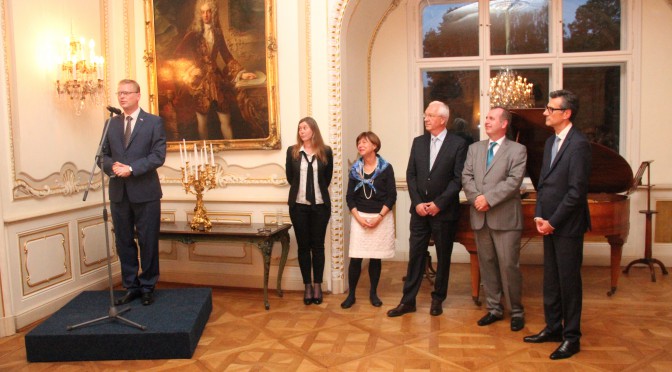
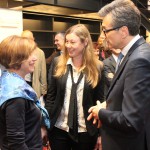 Nový prostor byl slavnostně otevřen 7. října v 17 hodin za účasti velvyslance Jeana-Pierra Asvazadouriana, předsedy AV ČR Jiřího Drahoše, rektora Univerzity Karlovy Tomáše Zimy, partnerů z CNRS Pascala Martyho a Diane Brami. Ministerstvo zahraničních věcí ve Francii zastupoval Philippe Devaud. Hojnou účast naplnili kolegové ze tří institucí Platformy CEFRES, mezi nimi Lenka Rovná, prorektorka pro evropskou problematiku Univerzity Karlovy a Pavel Baran, místopředseda Akademie věd ČR.
Nový prostor byl slavnostně otevřen 7. října v 17 hodin za účasti velvyslance Jeana-Pierra Asvazadouriana, předsedy AV ČR Jiřího Drahoše, rektora Univerzity Karlovy Tomáše Zimy, partnerů z CNRS Pascala Martyho a Diane Brami. Ministerstvo zahraničních věcí ve Francii zastupoval Philippe Devaud. Hojnou účast naplnili kolegové ze tří institucí Platformy CEFRES, mezi nimi Lenka Rovná, prorektorka pro evropskou problematiku Univerzity Karlovy a Pavel Baran, místopředseda Akademie věd ČR.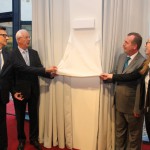 Dvůr domu v ulici Na Florenci 3 se tak stal symbolem posíleného spojení mezi Francií a Českou republikou, neboť knihovna CEFRESu teď hledí přímo na knihovnu
Dvůr domu v ulici Na Florenci 3 se tak stal symbolem posíleného spojení mezi Francií a Českou republikou, neboť knihovna CEFRESu teď hledí přímo na knihovnu 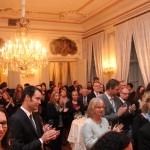 Slavnostní zahájení Platformy proběhlo na třech místech, které patří jejím partnerům. V 18h se na Velvyslanectví Francie v Praze shromáždila celá řada partnerů CEFRES, především univerzity v Brně, Pardubicích, Hradci Králové a v Ostravě, jež připomněly, že Platforma nestojí ve své snaze o česko-franouzskou spolupráci sama. Účast a proslov místopředsedy vlády pana Pavla Bělobrádka ukázal angažovanost vlády a její podporu humanitních a společenských věd a zájem o rozvíjení česko-francouzských vztahů.
Slavnostní zahájení Platformy proběhlo na třech místech, které patří jejím partnerům. V 18h se na Velvyslanectví Francie v Praze shromáždila celá řada partnerů CEFRES, především univerzity v Brně, Pardubicích, Hradci Králové a v Ostravě, jež připomněly, že Platforma nestojí ve své snaze o česko-franouzskou spolupráci sama. Účast a proslov místopředsedy vlády pana Pavla Bělobrádka ukázal angažovanost vlády a její podporu humanitních a společenských věd a zájem o rozvíjení česko-francouzských vztahů.
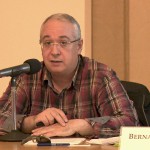 asteneckém sále Karlovy Univerzity. Bernard Lahire v ní vyzdvihl význam interdisciplinárních přístupů k výzkumu o společenském světě, od dějin umění po biologii a neurovědu.
asteneckém sále Karlovy Univerzity. Bernard Lahire v ní vyzdvihl význam interdisciplinárních přístupů k výzkumu o společenském světě, od dějin umění po biologii a neurovědu. 